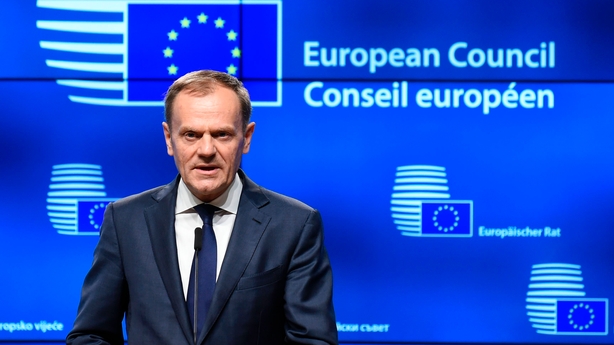Taoiseach Enda Kenny and British Prime Minister Theresa May have held talks in Brussels on the margins of a two-day EU summit.
The two leaders discussed the Northern Ireland Assembly Election results and the Brexit negotiations which are due to start shortly after Mrs May triggers Article 50 some time before the end of this month.
Mr Kenny said that a political solution could be found to avoid a hard border on the island of Ireland.
The Taoiseach earlier said maintaining a seamless border on the island of Ireland is a "political challenge" that will have to be faced during the Brexit negotiations.
Maintaining a seamless border a 'political challenge' - Taoiseach pic.twitter.com/O1bnAYM9O7
— RTÉ News (@rtenews) March 9, 2017
The meeting between Mr Kenny and Mrs May lasted for about 30 minutes, with the Assembly Elections and Brexit dominating the discussion.
Mr Kenny is said to have urged the prime minister to make more progress on the so-called legacy issues relating to the conflict, and he referred to previous discussions he had held with former prime minister David Cameron on the issue.
Mrs May said she would raise the issue with the Northern Ireland Secretary James Brokenshire.
Both expressed optimism that a solution could be found that would preserve the Common Travel Area and avoid a hard border
It is understood the Taoiseach said that it should not be beyond the capacity of Britain, Ireland and the remaining EU member states to make the border as soft as possible.
In a news conference, Mrs May said she still hoped that a comprehensive trade agreement between the UK and the EU could be done quickly, saying again it was in both Britain's and the EU's interests.
The Irish Government would certainly be keen for the trade issue to be resolved, as it is that which will govern how hard or soft the land border in Ireland is.
But all the indications are that a trade deal will take much, much longer than two years, and that there's no guarantee that the political creativity Dublin says is available will actually be fully forthcoming.
Earlier, former deputy UK prime minister Nick Clegg said he could not envisage a border anywhere in the world which had to deal with customs, VAT, tariff and animal health issues that was not a "hard" border.
In response, Mr Kenny said: "The negotiations haven't actually started yet. Clearly we have a seamless border between Republic and Northern Ireland. The political agreement is that that will continue.
"The political challenge is to make it continue."
Mr Kenny said that all EU leaders and the EU's chief negotiator Michel Barnier "clearly" understood Ireland's circumstances, "which is a peace process backed by an internationally legally binding agreement, and backed by peace funds from the EU".
Tusk warns Poland: 'Be careful of the bridges you burn'
European Council President Donald Tusk warned his native Poland to avoid burning its bridges with the bloc after the right-wing Polish government was isolated in opposing his re-election.
Earlier, Mr Tusk was re-elected as president despite an attempt by his home country to block a second term.
"Be careful of the bridges you burn because once they are gone you can never cross them again," he told a press conference at a summit of European Union leaders.
"I want to dedicate this to all member states, especially before our discussion on the future of Europe before the Rome (summit) celebration, but today especially to the Polish government," he said.
European leaders voted by 27 to one, according to a French diplomatic source, while Luxembourg Prime Minister Xavier Bettel tweeted: "Habemus #EUCO Presidentum."
Habemus #EUCO Presidentum, Good Luck @eucopresident Donald. XB pic.twitter.com/7eNpsIt70R
— Xavier Bettel (@Xavier_Bettel) March 9, 2017
Meanwhile, Polish Prime Minister Beata Szydlo confirmed that she would officially block the final statement from the summit after the re-election of Mr Tusk.
She told reporters: "I've confirmed that I will not accept the conclusions of the European Union summit." Earlier, Ms Szydlo accused Mr Tusk of criticising policies back home.
However, most observers saw this as rooted in the toxic rivalry which has escalated since the right wing Law and Justice Party came to office in October 2015.
Earlier, German Chancellor Angela Merkel said the re-election Mr Donald Tusk is a "sign of stability" for the bloc.
"I see his re-election as a sign of stability for all of Europe, and I am happy to continue working with him," Ms Merkel told the German parliament before heading to the summit of EU leaders.

This two-day summit will focus on a range of issues.
The EU wants to rekindle regional trade agreements now that President Donald Trump has taken the US on a more protectionist course.
There are also growing concerns that tensions are rising in the Western Balkans where a bitter civil war followed the breakup of Yugoslavia 20 years ago.
Those countries have been at peace and in line for EU membership, but that process has stalled and there are fears that Russia is beginning to exert what some would see as a malign influence in the region.

